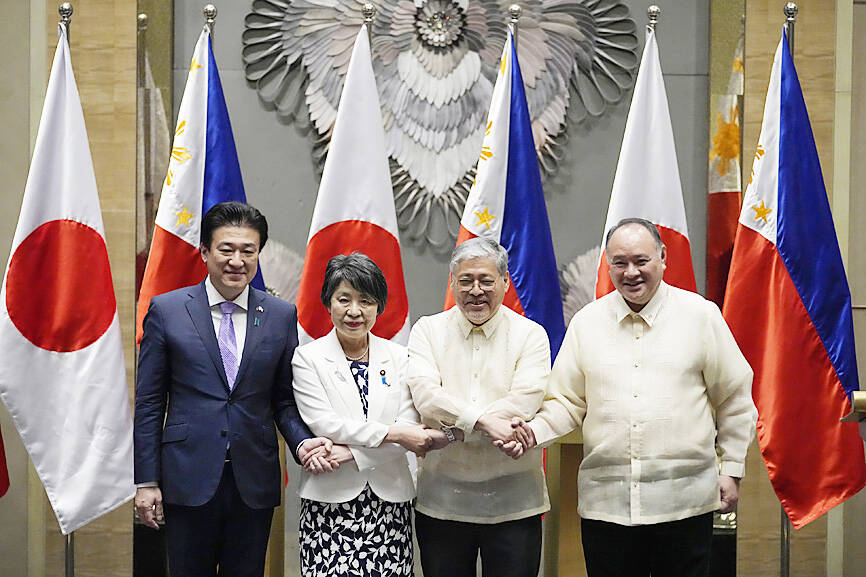Japan and the Philippines yesterday signed a key defense pact, allowing the deployment of Japanese forces for joint drills in the Southeast Asian nation that came under brutal Japanese occupation in World War II, but is now building an alliance with Tokyo as both face an increasingly assertive China.
The Reciprocal Access Agreement, which similarly allows Filipino forces to enter Japan for joint combat training, was signed by Philippine Secretary of Defense Gilberto Teodoro and Japanese Minister of Foreign Affairs Yoko Kamikawa in a Manila ceremony witnessed by Philippine President Ferdinand Marcos Jr.
It would take effect after ratification by the countries’ legislatures, Philippine and Japanese officials said.

Photo: AP
Kamikawa called the signing of the defense agreement “a groundbreaking achievement” that should further boost defense cooperation between the countries.
The Japanese and Philippine officials “expressed serious concern over the dangerous and escalatory actions by China” in Second Thomas Shoal (Renai Shoal, 仁愛暗沙), the scene of a recent confrontation between Chinese and Philippine forces in the South China Sea.
They underscored in a joint statement the need “for the international community to speak out on the importance of maintaining and strengthening the free and open international order based on the rule of law” in the disputed waters.
There was no immediate comment by Chinese officials.
The defense pact with the Philippines, which includes live-fire drills, is the first to be forged by Japan in Asia. Japan signed similar accords with Australia in 2022 and with Britain last year.
Under Japanese Prime Minister Fumio Kishida, the nation has taken steps to boost its security and defensive firepower, including a counterstrike capability that breaks from the country’s postwar principle of focusing only on self-defense. It is doubling defense spending in a five-year period to 2027 in a move to bolster its military power and make Japan the world’s third-biggest military spender after the US and China.
Many of Japan’s Asian neighbors, including the Philippines, came under Japanese aggression until its defeat in World War II, and Tokyo’s efforts to strengthen its military role and spending could be a sensitive issue. However, Japan and the Philippines have steadily deepened defense and security ties.
Kishida’s moves dovetail with Marcos’ effort to forge security alliances to bolster the Philippine military’s limited ability to defend its territorial interests in the South China Sea. The busy sea passage is a key global trade route which has been claimed virtually in its entirety by China, but also contested in part by Taiwan, the Philippines, Vietnam, Malaysia and Brunei.

STILL COMMITTED: The US opposes any forced change to the ‘status quo’ in the Strait, but also does not seek conflict, US Secretary of State Marco Rubio said US President Donald Trump’s administration released US$5.3 billion in previously frozen foreign aid, including US$870 million in security exemptions for programs in Taiwan, a list of exemptions reviewed by Reuters showed. Trump ordered a 90-day pause on foreign aid shortly after taking office on Jan. 20, halting funding for everything from programs that fight starvation and deadly diseases to providing shelters for millions of displaced people across the globe. US Secretary of State Marco Rubio, who has said that all foreign assistance must align with Trump’s “America First” priorities, issued waivers late last month on military aid to Israel and Egypt, the

France’s nuclear-powered aircraft carrier and accompanying warships were in the Philippines yesterday after holding combat drills with Philippine forces in the disputed South China Sea in a show of firepower that would likely antagonize China. The Charles de Gaulle on Friday docked at Subic Bay, a former US naval base northwest of Manila, for a break after more than two months of deployment in the Indo-Pacific region. The French carrier engaged with security allies for contingency readiness and to promote regional security, including with Philippine forces, navy ships and fighter jets. They held anti-submarine warfare drills and aerial combat training on Friday in

COMBAT READINESS: The military is reviewing weaponry, personnel resources, and mobilization and recovery forces to adjust defense strategies, the defense minister said The military has released a photograph of Minister of National Defense Wellington Koo (顧立雄) appearing to sit beside a US general during the annual Han Kuang military exercises on Friday last week in a historic first. In the photo, Koo, who was presiding over the drills with high-level officers, appears to be sitting next to US Marine Corps Major General Jay Bargeron, the director of strategic planning and policy of the US Indo-Pacific Command, although only Bargeron’s name tag is visible in the seat as “J5 Maj General.” It is the first time the military has released a photo of an active

CHANGE OF MIND: The Chinese crew at first showed a willingness to cooperate, but later regretted that when the ship arrived at the port and refused to enter Togolese Republic-registered Chinese freighter Hong Tai (宏泰號) and its crew have been detained on suspicion of deliberately damaging a submarine cable connecting Taiwan proper and Penghu County, the Coast Guard Administration said in a statement yesterday. The case would be subject to a “national security-level investigation” by the Tainan District Prosecutors’ Office, it added. The administration said that it had been monitoring the ship since 7:10pm on Saturday when it appeared to be loitering in waters about 6 nautical miles (11km) northwest of Tainan’s Chiang Chun Fishing Port, adding that the ship’s location was about 0.5 nautical miles north of the No.